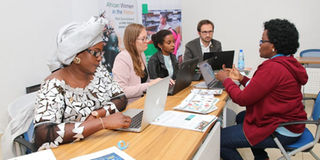AU nod to journalists meeting big boon for equity and empowerment

Some of the participants at this year's African Women in the Media (AWiM19) during a panel session at the University of Nairobi on July 27, 2019. PHOTO | NJERI RUGENE | NATION MEDIA GROUP
What you need to know:
This agenda would not only be empty and meaningless but also hollow were it to exclude a comprehensive, workable and realistic plan to ensure gender equality and women empowerment.
Both genders — and especially leaders — would be actively and genuinely involved in efforts to ensure that women, girls, boys and men live in a society that respects and recognises that they are all one in a continent where opportunities are shared equally and rights for all are respected.
The African Union was not only the key sponsor of the third African Women in the Media conference (AWiM19), the largest gathering of its kind, which was recently held in Nairobi and brought together some of the top women journalists in Africa, but also undertook to fund a category of stories on critical issues affecting the continent.
SILENCE GUNS
AU representatives Leslie Richer (Director, Directorate of Information and Communication) and Wynne Musabayana (Head of Communications, AU Commission) said the ideas pitched at the three-day event were as powerful, innovative and impressive as the energy.
Kenya’s Mary Mwendwa and Christabel Ligami, Tanzania’s Vincensia Fuko and Zahara Tunda as well as Culton Scovia of Uganda were the lucky journalists whose stories and innovations Africa will soon read about, watch and listen to.
A key issue the journalists will write on is “Silencing the Guns”, an AU initiative to prevent and resolve violent conflicts with an eye to ending “all wars in Africa’’ by 2020. They will also write on the Free Movement of People within the continent as well as Women and Free Trade.
Besides the AU, the International Organisation for Migration (IOM) and German Corporation for International Development (GIZ) will also sponsor the stories.
I laud the AU for being part of this important women’s meeting. It is an indication that the AU is going beyond mere talk in its stated support for empowerment of women and gender equality to pursuance and implementation of its objective for the Africa it envisions in its Agenda 2063.
REALISTIC PLAN
This agenda would not only be empty and meaningless but also hollow were it to exclude a comprehensive, workable and realistic plan to ensure gender equality and women empowerment. Both genders — and especially leaders — would be actively and genuinely involved in efforts to ensure that women, girls, boys and men live in a society that respects and recognises that they are all one in a continent where opportunities are shared equally and rights for all are respected.
Calling on member states to embrace gender equality and empowerment of women, one of the AU’s stated key objectives, AU Commission chairperson Moussa Faki Mahamat was categorical that the issue now is about concrete measures to translate that into action, this as the ultimate object for achieving Agenda 2063 and Sustainable Development Goals (SDGs).
However, member states need to step up their efforts on empowerment of their women and girls and measures and programmes to ensure gender equity and equality as well as empowerment of women.
Reports emanating from Africa still draw a general picture of doom and gloom as far as gender equity in key aspects of development in socioeconomic and political sectors is concerned. African governments must come out strongly and show the will to implement these aspects of development as opposed to the very obvious rhetoric that accompanies pledges and talk of gender equality and equity.
GENDER VIOLENCE
They must also lead through action in fighting all forms of violence against women, girls and children and, indeed, all humanity in Africa perpetrated by warring sides, political rivals, individuals, government agencies and others.
It is critical that African governments hold one another accountable when countries look the other way to ignore the objectives of Agenda 2063, and in particular Article 4L of the Constitutive Act of the African Union, which also provides for gender issues.
In July last year, at the AU’s 31st Summit of Heads of State and Government at Nouakchott, Mauritania, the leaders adopted a comprehensive and articulate Gender Equality and Women’s Empowerment Strategy.
If implemented, in addition to well-drafted gender policies and constitutions, there will be progress in gender equity, equality and empowerment of women and development.
Ms Rugene is consulting editor. [email protected]





